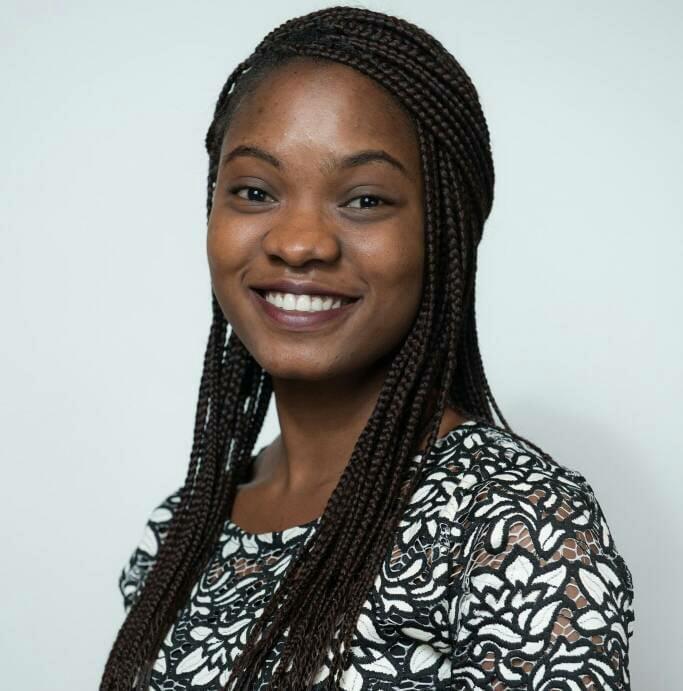Developing Data Frameworks to Help Rural Communities

About
| Name | Debbie Oyebanji |
| Title | Senior Economist |
| Company | Ministry of Jobs, Economic Development and Innovation |
| Grad Year | 2018 |
| Program | Master of Food and Resource Economics (course) |
February 26, 2024– Master of Food and Resource Economics (MFRE) alum Debbie has an exciting new role as Senior Economist at the Ministry of Jobs, Economic Development and Innovation. She shares her highlights as a student and the impact of her studies at UBC.
What were the highlights of university life at LFS and UBC?
In 2018, I organized and facilitated a session during the International Development Week on campus, focusing on “Women’s Roles, Challenges, and Opportunities in Food Security.” It allowed me to actively engage with a critical issue and lead meaningful discussions.
My master’s degree at UBC was fully funded by the MasterCard Foundation (MCF) Scholarship program. I remember I would always look forward to MCF sessions, from the community kitchens to the leadership meetings, retreats at the beginning of the semester. It just felt good to be supported by such a strong, integrated community.
The MFRE program supported me to attend the 30th International Conference of Agricultural Economists in 2018 where I engaged and exchanged ideas with experts. Connecting with some of my former professors from my undergraduate degree in Nigeria was the cherry on top of the experience.
How has your experience as a UBC alum influenced your work?
I came into UBC as an international student in 2017, it was my first time in Canada and first time out of Nigeria. The rigorous academics instilled critical thinking and problem-solving skills, while the diverse community taught me the value of collaboration. LFS instilled in me a commitment to lifelong learning, which continues to drive my professional growth today.
What are you currently working on?
I work with the BC Ministry of Jobs, Economic Development, and Innovation as a Senior Economist (27). I am working on building a rural data program for the province as there currently is no standardized rural-specific data collection approach or process specific to British Columbia’s unique geography.
How did your time in LFS on the MFRE Program impact you in your career since graduating?
The MFRE program laid the groundwork for my career, equipping me with essential economic principles, quantitative analysis, and policy evaluation skills. My internship at Vancity marked my introduction to the Canadian work environment, providing me with practical skills directly applicable to diverse work sectors. From my roles at the BC Vegetable Marketing Commission, to my current volunteer role as a director on the board of FarmFolk CityFolk, BC’s oldest and largest agriculture non-profit organization, the program’s trainings/exposure have been pivotal. Notably, without my MFRE studies, I wouldn’t have met the minimum requirements for my current position with the BC government, highlighting the program’s importance in specialized resource economics education. Additionally, the program fostered invaluable connections and relationships critical for my career growth.
How do you stay connected to LFS and your alumni community?
I make an effort to keep in touch with my former professors and classmates, maintaining communication through gestures like sending out Christmas/holiday cards to my professors, faculty members at LFS and some old classmates. I also engage with the MFRE social media platforms to stay updated on the latest news and developments within the program and at LFS.
What advice would you give to students graduating this year?
Here’s a list I wish someone had shared with me to stand out from the crowd when I was graduating:
- Identify the industry or company you’re interested in.
- Determine the job roles that appeal to you.
- If there’s a posted position, find the hiring manager.
- Connect with people who work with the hiring manager or on the team you’re targeting.
- Schedule informational chats with 3 to 4 team members.
- Reach out via email or message to the hiring manager, referencing your connections to the team members (mention their names) and expressing your enthusiasm for the role and how you bring value to the team.
Some of the individuals you engage with will refer you for other positions. This process allows you to gain firsthand insights from someone currently in the role, enabling you to assess whether it aligns with your preferences and values. Remember, while the company evaluates you, you also have the opportunity to determine if their culture and values resonate with yours.
What was your favorite hangout while studying at UBC? Your favorite place to eat?
I enjoy going to the UBC Aviary in the AMS Nest on campus. It is a cozy climbing gym run by friendly volunteers, plus it is cheap. Just be sure to check the schedule before planning your visit. For lunch options, Agora Café is a personal favorite. It offers affordable meals sourced primarily from local gardens, making it both healthy and sustainable.
Tagged with: 2024, Alumni, Master of Food and Resource Economics